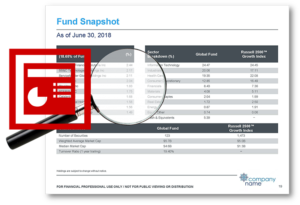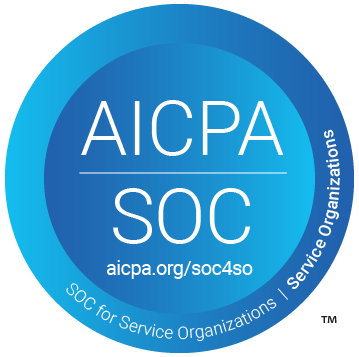Benchmarking and the Tailored Shareholder Report: Staying on the SEC’s Good Side
 Similar to how it handled the Marketing Rule from a few years ago, the SEC is leaving much to the imagination for fund companies when implementing aspects of the Tailored Shareholder Reporting rule.
Similar to how it handled the Marketing Rule from a few years ago, the SEC is leaving much to the imagination for fund companies when implementing aspects of the Tailored Shareholder Reporting rule.
While it is true the agency has provided several required content areas and datasets for inclusion, how exactly those pieces of content and data are to be crafted and presented are somewhat open for interpretation.
From speaking with clients and other fund companies, one of the most discussed and problematic areas for fund teams relates to the SEC’s mandate for the inclusion of an “appropriate broad-based market index” (what we will call BBMI) against which funds can be compared.
What was the SEC’s thinking here?
Why did they decide to change the benchmarking requirements?
What was the logic? And how can fund companies, understanding that logic, approach benchmarking in a way that meets the mandate?
A Few Notes From Our Tailored Shareholder Report Webinar
“Marketing has a very large place at the table.”
“There are a whole host of requirements [around ADA compliance] that aren’t going to be fun.”
“Having good discipline… is especially important as fund boards… make inquiries about the due diligence you are performing.”
“I would not want to be the asset manager that misses the deadline”
In our recent webinar, “Are Your Systems Ready? 6 Questions to Answer About the Tailored Shareholder Rule,” we covered a lot of ground across the areas of compliance, operations and technology, and project management.
In a free-flowing one hour discussion that ran from compliance to operations and technology to project management and execution (view the whole thing here) justice , here are a sampling of the things we discussed.
Measure Twice, Cut Once: Effective Tailored Shareholder Report Design
View our recorded webinar (8/2/23):
Are Your Systems Ready? 6 Questions to Answer About Implementing the Tailored Shareholder Rule
As we noted in our piece on Automation, Business Rules, and the SEC’s new Tailored Shareholder Report rule, figuring out the implementation strategy is the challenge.
Because Tailored Shareholder Reports aren’t merely abbreviated shareholder reports, they may offer ‘40 Act asset managers with an opportunity to revisit and rethink their approach to their shareholder reporting regimen.
By doing so actively and creatively, other data-driven marketing, sales, and compliance documents can leverage this new integrated approach to improve their functionality as well.
And now that SEC Rule 30e-3, which allowed for paper notification of online shareholder report filings, has been rescinded for the Tailored Shareholder Report, creating a more streamlined and efficient reporting process is warranted.
Given our deep experience in the investment data/content automation world, we see many parallels between our traditional areas of expertise and Tailored Shareholder Report strategy. After all, these are, at their core, a fact sheet in disguise.
Tailored Shareholder Reports: Automation, Business Rules, and Simplicity
’40 Act Funds need a TSR strategy
Find our Tailored Shareholder Report Planning Guide here.
By now, the entire ’40 Act Fund world is aware of the SEC’s new Tailored Shareholder Report (TSR) mandate.
Some questions linger (“What’s the right ‘broad-based index?‘”), but asset managers are making it a high priority to determine their Tailored Shareholder Report implementation strategy and its operating model implications.
Unfortunately, it’s not simply a matter of creating a (massively) shortened annual report – the specifics of the rule mean that new approaches to content strategy, business rules, and related policies and procedures are needed across numerous business functions:
- Fund treasury
- Financial reporting
- Client services
- Legal/compliance
- External service providers and auditors.




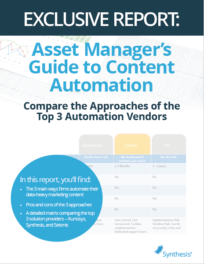 Compare the Top 3 Finserv Content Automation Vendors [White paper]
Compare the Top 3 Finserv Content Automation Vendors [White paper]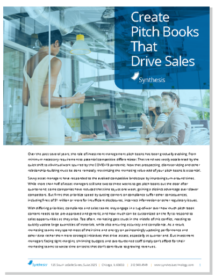 Create Pitchbooks the Drive Sales [White paper]
Create Pitchbooks the Drive Sales [White paper] Build vs. Buy: Should Your Financial Services Firm Outsource or Insource Marketing Technology? [White paper]
Build vs. Buy: Should Your Financial Services Firm Outsource or Insource Marketing Technology? [White paper] 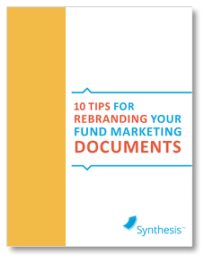 10 Tips for Rebranding your Fund Marketing Documents [White paper]
10 Tips for Rebranding your Fund Marketing Documents [White paper]